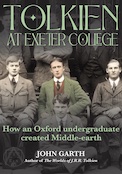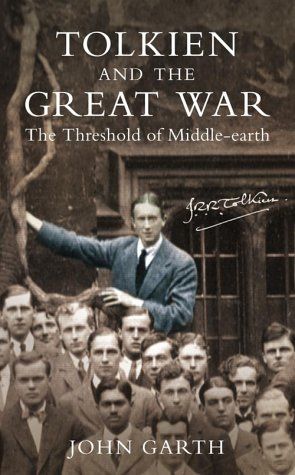Tolkien and the Great War
Reviewed by A.N. Wilson
(author of C.S. Lewis: A Biography and many others)
in the London Evening Standard
“This is very much the best book about Tolkien that has yet been written” |
In October 1916, one of the thousands of young men caught up in the Battle of the Somme was Second Lieutenant Ronald Tolkien of the 11th Lancashire Fusiliers. He subsequently developed trench fever, brought on by the lice.
But he survived; he was one of the lucky ones. Of the 600 in his battalion, 60 were dead, 74 missing and 450 wounded.
Tolkien, the author of one of the most popular stories of struggle and endurance ever written in the history of the English language - come to that, in the history of the human race - was part of that tragic generation whom we remember with awe and gratitude at this time of year.
“By 1918,” he wrote half a century later in a preface to the second edition of The Lord of the Rings, “all but one of my close friends were dead.”
John Garth, in this new study of Tolkien, shows two very considerable areas of expertise. He has mastered the complicated history of the First World War, its battles and campaigns. His narrative, of how young Tolkien and his schoolfriends fared during the war, is fleshed out with deep research in war diaries and letters and dispatches found in the Public Record Office and elsewhere.
He is also thoroughly versed in Tolkien’s minor works, the so-called Lost Tales, and other literature, which the author left behind him when he died and which has been punctiliously edited by his son, Christopher Tolkien.
This is very much the best book about JRR Tolkien that has yet been written, because it concentrates on the one thing that interests us about a writer - namely the evolution of his imaginative life. It traces the story of the Birmingham schoolboy who, as a South African of German racial origins, always felt a bit of an outsider, and whose sense of solitude was increased by losing both his parents by the time he was 12. He blamed his mother’s early death - its immediate cause was diabetes - on the hardship she endured when she was converted to Roman Catholicism, and ostracised by the family.
This deeply introverted boy received the most wonderful education at Edward VI School, Birmingham, the alma mater of, among others, all the best English New Testament Greek scholars of the 19th century and, more recently, David Willetts and Enoch Powell. The thought of a J.R.R. Tolkien of today being forced into the comprehensive system makes one shudder. (You did right, Diane Abbott!) By the time he was 18, not only was he a competent classicist, but he had fluent German, and had invented many languages and mythologies. Once he began to read the Finnish Kalevala, the Norse Edda and Anglo-Saxon poetry, his imagination was fired to invent and reinvent the mythologies which became the background, eventually, to The Lord of the Rings.
Christopher Tolkien has done a heroic thing in laying out all the material that traces this evolution, but few but the greatest
| “I have rarely read a book which so intelligently graphed the relation between a writer’s inner life and his outward circumstances” |
enthusiasts will ever be able to make sense of it all. John Garth does this - he chooses the salient passages, including stuff which is not yet in print - and watches Tolkien’s mind grow.
He is far from uncritical. For example, he regrets the ironing out, as The Silmarillion evolved, of the grotesque and the cruel elements in earlier versions of the mythology. And he thinks much more highly of the cruder, earlier creation-mythology than of the finished Valaquenta (which I think Tolkien’s finest work).
Without saying so so rudely, he concedes that much of what Tolkien wrote was tosh, but he painstakingly makes a case for the greatness and, above all, the originality of the man and his creations.
There was no writer remotely like Tolkien. Perhaps without the experience of comradeship, battle and tragic loss that was forced upon him by the Great War, Tolkien’s imaginative world would only have been a weird philological fantasy. Its capacity at times to rise to near-Homeric greatness surely grew out of his experiences as a young soldier on the western front. No writer before John Garth has been patient enough to explore not merely the obvious truth of this, but the more complicated matter of how the truth applies itself in each of the relevant texts, major and minor.
Even if you are not a Lord of the Rings fan, I commend this book to you. It is all so interesting in itself, and I have rarely read a book which so intelligently graphed the relation between a writer’s inner life and his outward circumstances.
© Evening Standard. Reproduced with permission. First published 10 November 2003 as “War and Middle-earth. How Tolkien’s experience in the Great War shaped his imaginative life”.
The Worlds of
J.R.R. Tolkien
UK hardback
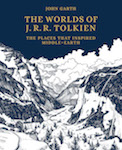
US hardback

To buy in French, Russian, Czech, Spanish, Italian, Finnish, Hungarian, German, or another language
see links here
Buy
Tolkien and
the Great War
UK paperback/ebook
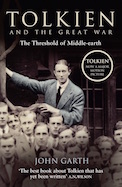
US paperback/ebook
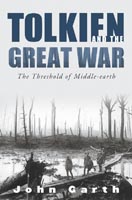
Audiobook read by
John Garth
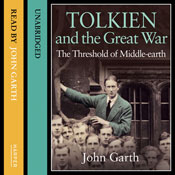
Amazon UK, Audible UK,
Audible US
To buy in Italian, German, French, Spanish or Polish,
see links here
Buy
Tolkien at
Exeter College
